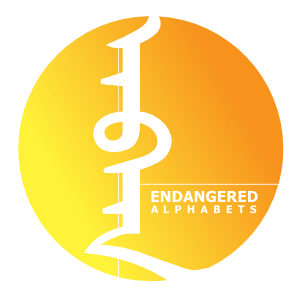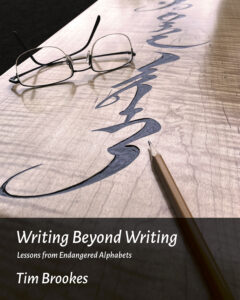In the nineteenth century, when an explorer returned to London or New York from distant lands, the tradition was to invite them to speak at the Royal Geographical Society or the Explorers Club, to report on their findings.
Tim Brookes has spent 13 years discovering the world’s fascinating indigenous and minority scripts and their cultures of origin.
He found scripts that have been banned and burned, script creators who have been assassinated, scripts consisting of geometrical patterns in sand, scripts used for divination and magic, scripts whose scribes abstained from sex before embarking on acts of writing or copying, and, perhaps most remarkable of all, a sacred Indian alphabet that is recited aloud as a religious ritual.
This book is the equivalent of his talk to the Explorers Club, and also the response to an imagined question from the imaginary audience: “What can we learn from your journey about writing itself?”
In response, he offers not only new perspectives but even new definitions of writing—and a new way of thinking about how our own beliefs about writing have affected the world, and not necessarily for the better.
Read an interview with Tim Brookes talking about Writing Beyond Writing.
NEW! Join the Writing Beyond Writing Book Club to discover and explore all kinds of new and unexpected insights into the nature of writing itself! Information and Signup HERE.
Download a free excerpt from Writing Beyond Writing [PDF]
Orders
Softcover edition
$32.00 plus shipping
Hardcover edition
$49.95 plus shipping
Ebook edition
$7.95
As the book includes a lot of non-Latin minority scripts, this edition is not compatible with commercial e-readers. But it will be perfect for reading as a PDF on PCs, laptops and phones. Order it here through PayPal and I’ll email it to you as soon as I get the order–no need to download.
Book club edition
Minimum order of six softcover copies comes with a free one-hour Zoom conversation with the author.
Classroom edition
Minimum order of ten softcover copies comes with a free one-hour Zoom conversation/discussion/lecture and a set of discussion questions.
To request a review copy, email info@endangeredalphabets.com.
For foreign /translation rights and all other inquiries, email info@endangeredalphabets.com.
Reviews
Ogmios, the newsletter of the Foundation for Endangered Languages
Writing beyond writing
Tim Brookes: Writing beyond Writing. Published by The Endangered Alphabets Project, 2023
Tim Brookes is no stranger to readers of Ogmios: he will be known to you already for his researches into endangered alphabets, and his sensitive and exquisite work in carving examples of those scripts. Here, though, is something more marvellous still: a distillation of Tim’s thoughts on and experiences with scripts from across the world.
Modest and unassuming are adjectives that apply to Tim on his voyage of discovery. He knows that he is ploughing new territory, since so many scholars in the field of endangered languages assume the primacy of the spoken word. Tim is ever ready to learn from the masters of these scripts, and in this relatively unknown field he is unlikely to be contradicted by ‘experts’.
Tim senses that these ‘spoken-language’ linguists have a disdain for writing. I quote from p. 23:
“Writing is a means of using abstract visible symbols to represent the sounds of speech.” Was that it? Was that all? I could see how that definition might seem to make sense historically, as humans began speaking a long time before they began writing, but my travels among endangered alphabets had shown over and over again that writing clearly represents more than merely the sounds of speech. If that were the case, then when a script is driven out of use, to be replaced by some other script, those ancestral written characters would surely be meaningless and useless.
In a modern multilingual world, where users of minor languages are also familiar with major ones, it may well be that they write their shopping lists and notes for the milkman in the customary major language, scrawling with a ball-point pen, but the messages they wish to pass on beyond the present time and generation in their traditional minority script. This may or may not be true, but Tim’s book leads one to this conclusion. What he has chosen to emulate and carve, exquisitely on wood, are not mere transitory messages: they are the embodiments of tradition, and therefore of unique wisdom: proverbs, religious texts, maxims. Tim Brookes has a great reverence for writing.
Writing, it seems to me, consists of layer upon layer of identity and meaning, some of which is, in a sense, hidden in plain sight because we don’t think in those terms. Increasingly over the past decade I’ve been looking at writing from unusual angles, trying to catch sight of glimpses of its unnoticed and unconsidered power. This chapter, as non-linear as art itself, offers some of those glimpses. (p. 53) And indeed the whole book does that.
The chapters of the volume reflect Tim Brookes’ personal development and expanding awareness of the diversity of the world’s scripts.
While completing this review I have been in Java, whose own particular indigenous script seems to be a particular favourite of Tim’s. Today the Javanese script is still occasionally used in signage that can be seen in the urban jungle that is modern Java – a relic of a more gracious and refined era in the island’s his-tory when individual calligraphy was given expression in the sinuous, harmonious strokes of its elegant script. While the Roman script is efficient at rendering the ubiquitous standardised Bahasa Indonesia, the flowing Javanese calligraphy, with its harmonious use of writing materials and natural surfaces, perfectly reflects the culture of this land of wood-carvers and etchers.
The chief joy of this book is the sheer variety of scripts represented in it. There are other books on the story of writing, chronological studies such as those by David Diringer, George Campbell, Florian Coulmas and others, but they don’t give the reader the same opportunity to see unexpected connections between scripts of widely diverse origins. Brookes casts his net wide, even covering the sand drawings of Vanuatu. Magic, ritual and religion in writing are subject of a special chapter.
True to Tim Brookes’ sensitivity to alphabet design, the book is set in the Artigo and Alegreya Sans typefaces, to offset its copious illustrations.
Chris Moseley
Editor
Midwest Book Review
The outcome of a life’s work as a successful writer and a dozen years of researching the world’s indigenous and minority writing systems, Writing Beyond Writing: Lessons from Endangered Alphabets by Tim Brookes is an entirely original exploration of writing itself.
As the world’s leading investigator of rare alphabets, Brookes examines the world’s fascinating and often stunning disappearing minority scripts and shows that writing can and often does have qualities we have forgotten — iconic qualities, community values, spiritual qualities, even magical qualities.
Brookes considers the ways in which we in the West have increasingly defined writing as something abstract, purely symbolic, merely a mechanical tool for representing the sounds of speech, and asks what is lost when writing is reduced to such a narrow and colorless definition.
Brookes also shows that just as many cultures around the world are reviving their embattled traditional alphabets, even in the West the old division between writing and art is being healed in surprising ways — and right under our noses!
A fascinating, informative, thoughtful and thought-provoking study that will have a particular and special value for readers with an interest in the history and evolution of the alphabet and written languages, as well as the cultural implications of diverse writing styles from antiquity down to the present day.
A bibliographer’s delight and unreservedly recommended for community and college/university History of Writing collections and supplemental curriculum studies lists, this large format hardcover edition of Tim Brookes seminal and ground-breaking work, Writing Beyond Writing: Lessons from Endangered Alphabets from Percentage Possibility Publications is also readily available for students academia, and non-specialist general readers in a paperback edition.

